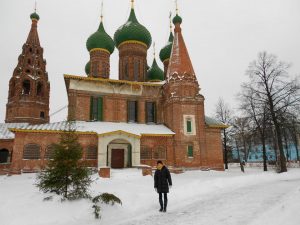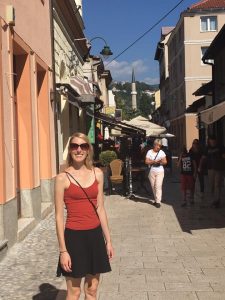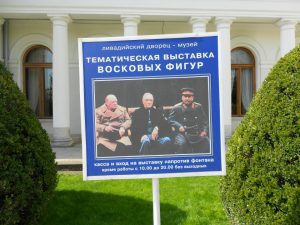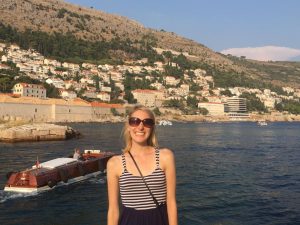From Russia with Love…and Geopolitical Consequences
At a church in Yaroslavl, Russia,
the city where Maggie lived for 6 months
In 2012, I spent a semester studying abroad in Yaroslavl, Russia, a small, industrial city located about a four hour’s drive northeast of Moscow. The plan was to sharpen my Russian skills, travel and volunteer a little, and with some luck, figure out what I wanted to major in when I returned to my junior year studies at Brown.
My semester in Yaroslavl coincided with the Russian presidential election. Vladimir Putin, then the Prime Minister and former two-term President, had paved the way for another presidential term, this time for six years instead of four, by both circumventing and orchestrating revisions to the constitution. But he was certainly not the only candidate; a collection of opponents, ranging from an ultra-left wing communist to a billionaire who owns the New Jersey Nets, planned to challenge Putin’s intended autocracy.
Standing on the shore of the Black Sea
My friends at Yaroslavl State Pedagogical Institute were mostly supporters of Mikhail Prokhorov, the billionaire, for the presidency, and other opposition candidates for Yaroslavl’s mayorship. Curious to see what the voting process would be like, I accompanied my Russian friend to the polls. She intended to vote for Prokhorov, but when we spied cameras filming into each voting booth, we both knew she had no choice but to vote for Putin. That moment epitomized the political apathy I had observed in my Russian peers for months. In Russia, the constitution enshrines the right to free elections and peaceful assembly, yet throughout my time in Yaroslavl, I witnessed the break-up of peaceful rallies firsthand and saw my Russian classmates lose faith in all forms of democracy.
 Later that year, I traveled south to Ukraine’s Crimean peninsula, where the region’s ethnic, linguistic, and political differences struck me from the start. I remember graffiti, written in Russian words, that read “Crimea is Russia.” Below it, in Ukrainian graffiti, were the words “Crimea is Ukraine.” I was fascinated by how the region laid bare the tensions permeating a society where no single identity unites the people, as well as by the continued Russian dominance in the region.
Later that year, I traveled south to Ukraine’s Crimean peninsula, where the region’s ethnic, linguistic, and political differences struck me from the start. I remember graffiti, written in Russian words, that read “Crimea is Russia.” Below it, in Ukrainian graffiti, were the words “Crimea is Ukraine.” I was fascinated by how the region laid bare the tensions permeating a society where no single identity unites the people, as well as by the continued Russian dominance in the region.
Two years later, I watched from afar as Russia seized Crimea and invaded eastern Ukraine in a move that triggered lasting violence throughout the country. Suddenly, my thesis topic, which at that point had been of little interest to my professors or peers, was front page news. I petitioned to remain at Brown an extra semester, solely to conduct research, and was granted that right in late spring 2014. The conflict that emerged in eastern Ukraine transformed my thesis into a discourse analysis of Kremlin transcripts and Ukrainian, Russian and Western news publications. Armed with a research objective to examine how and why the Kremlin constructed a narrative of Ukrainian identity politics that simplified the country’s linguistic and ethnic complexity, I compiled and translated the primary source material and analyzed those documents against Western media reports.
Besides giving me a newfound love of long-term research, this project solidified my dedication to post-Soviet security issues—and to checking Russian aggression in Eastern Europe.
At Livadia Palace in Yalta,
where the Yalta Conference took place After graduating, I began a job in finance that I had committed to back when Crimea was still Ukraine. But I struggled to stay challenged, and I missed working on Russia, Ukraine, and relevant security issues. When a fellow alum of the Brown University Russian program told me about the Scoville Fellowship, I knew it was the ideal opportunity to help me break into the D.C. foreign policy community and embark on a career that would be fulfilling, and never dull.
After graduating, I began a job in finance that I had committed to back when Crimea was still Ukraine. But I struggled to stay challenged, and I missed working on Russia, Ukraine, and relevant security issues. When a fellow alum of the Brown University Russian program told me about the Scoville Fellowship, I knew it was the ideal opportunity to help me break into the D.C. foreign policy community and embark on a career that would be fulfilling, and never dull.
The past 6 months at the Arms Control Association has taught me more than I imagined I would learn about arms control and the value of strategic stability to regional security in Eastern Europe in the face of a mounting Russian threat. I’ve had the opportunity to publish extensively on these issues, and build my credibility as I prepare for the next step in my career: a U.S. Fulbright Scholarship to Ukraine to study conflict-related issues up close. The network, the knowledge, the exposure offered by the Scoville Fellowship promises to make this experience all the more richer, and I look forward to the opportunities to come.
Maggie Tennis is a Spring 2017 Scoville Fellow at the Arms Control Association.

